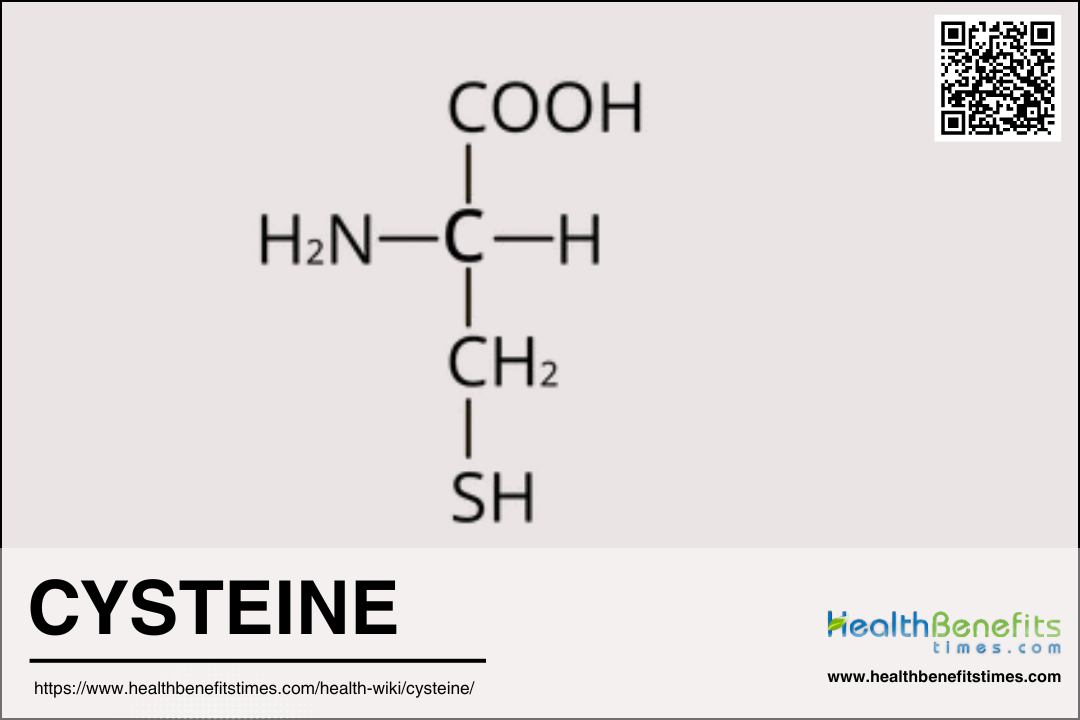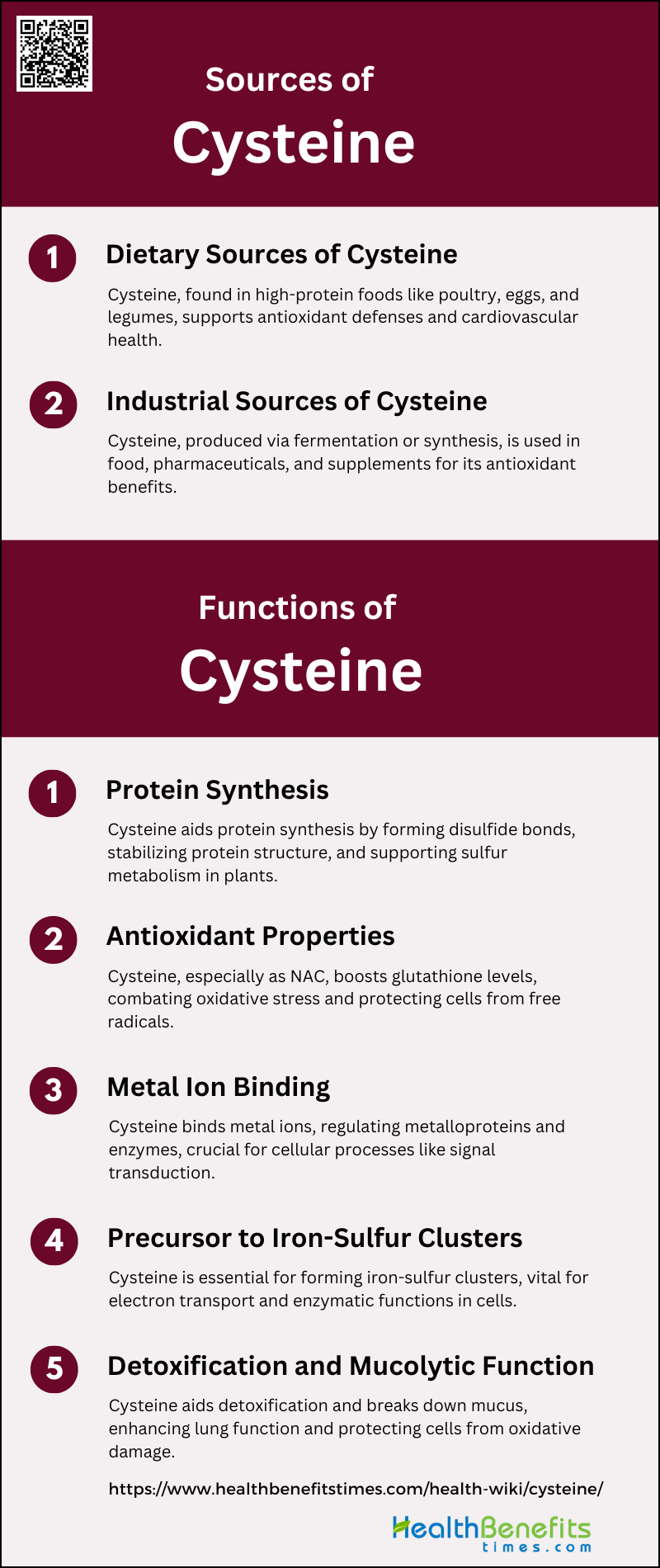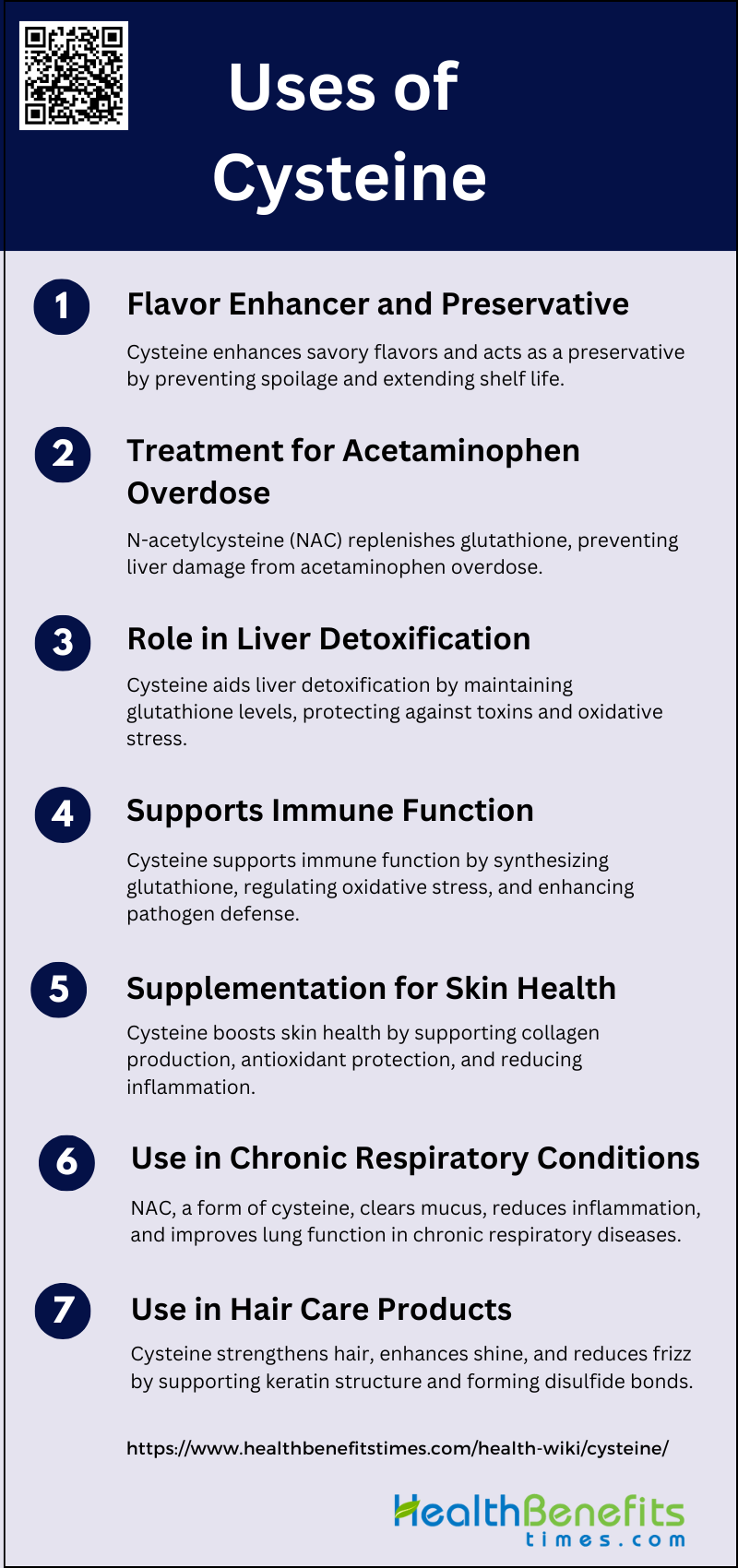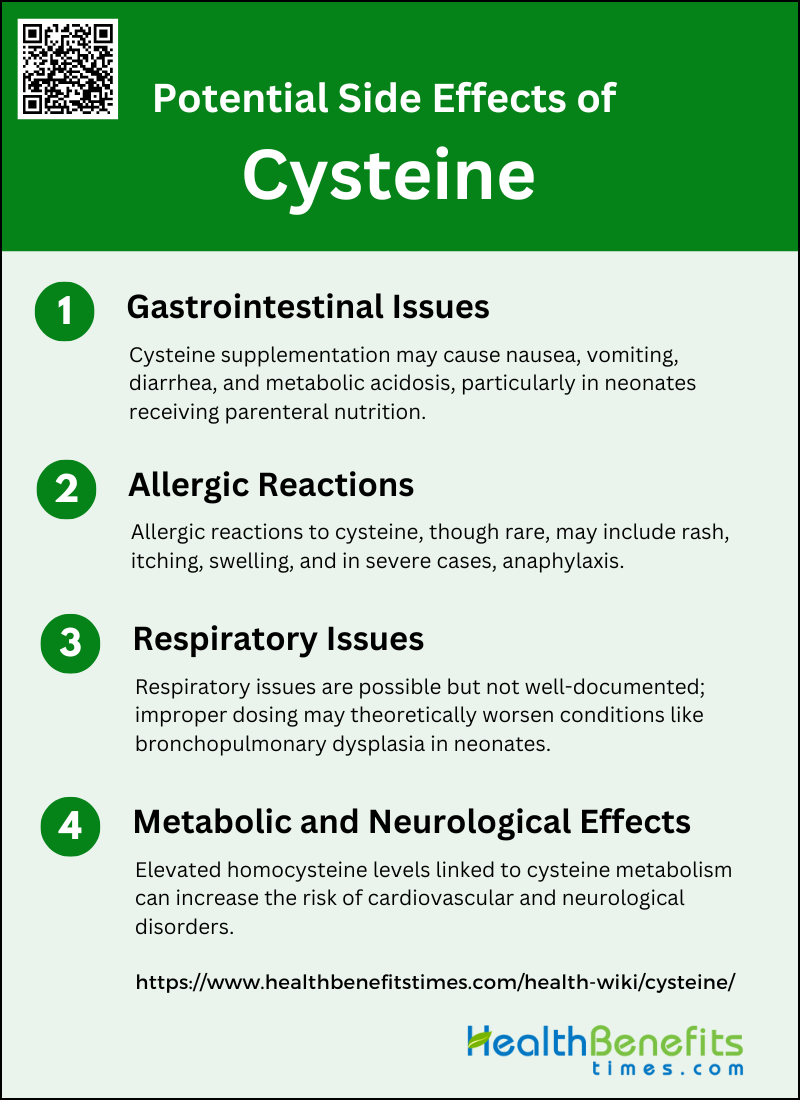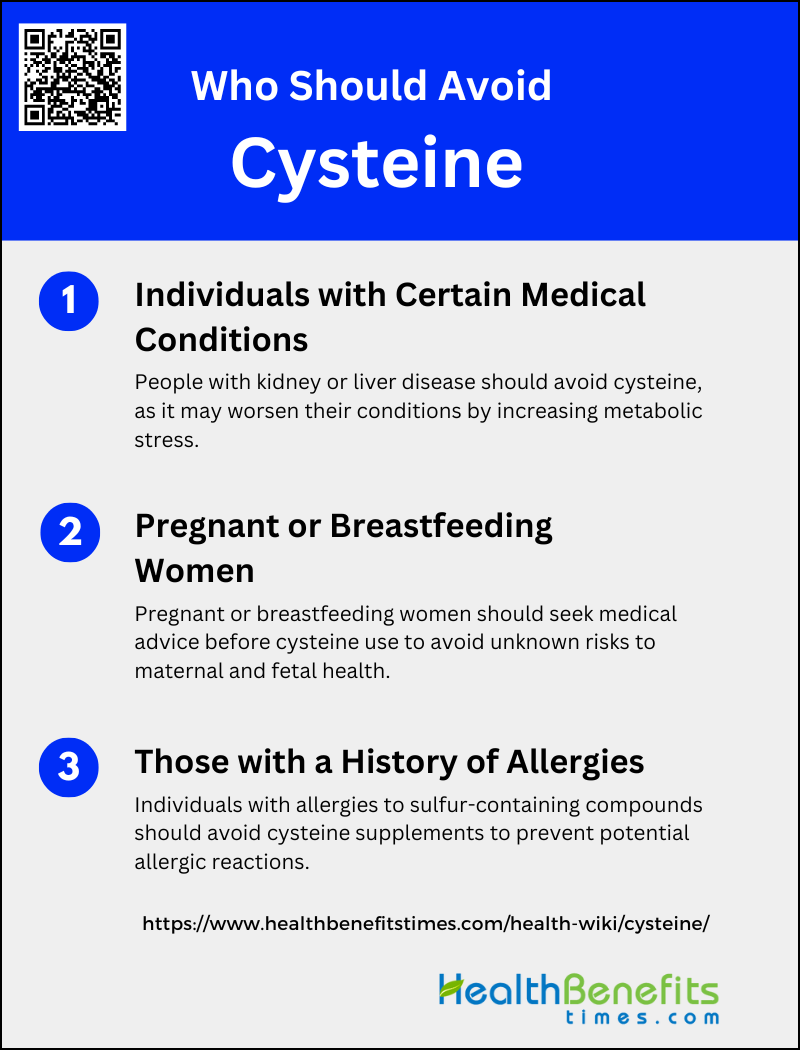Cysteine is a semiessential amino acid that plays a crucial role in various biological processes. It is primarily found in the extracellular space as L-cystine, which is transported into cells and reduced to L-cysteine by thioredoxin and reduced glutathione (GSH). Within cells, cysteine is vital for maintaining cellular homeostasis, serving as a precursor for protein synthesis, and the production of GSH, hydrogen sulfide (H₂S), and taurine. It also acts as a metabolic precursor for essential biomolecules such as vitamins, cofactors, and antioxidants, and is involved in plant immunity. Cysteine’s thiol group allows it to function as a redox molecular switch, contributing to redox homeostasis and signaling within cells. Additionally, cysteine is essential for the synthesis of iron-sulfur clusters and the regulation of protein structure and stability. Dysregulated cysteine metabolism is linked to various diseases, including neurodegenerative disorders, highlighting its importance in both health and disease.
Sources of Cysteine
Cysteine is an important amino acid that plays a vital role in numerous biological processes, and it can be obtained from various dietary sources. Incorporating foods rich in cysteine into your diet can support antioxidant defenses and overall health. Below are some of the primary sources of cysteine:
1. Dietary Sources of Cysteine
Cysteine is a semi-essential amino acid that can be obtained from various dietary sources. It is commonly found in high-protein foods such as poultry, eggs, dairy products, and legumes. Cysteine-rich proteins like whey and keratin are particularly beneficial as they can be manufactured into high-quality functional foods that enhance antioxidant status and improve health outcomes in certain diseases. Additionally, dietary proteins containing cysteine can modulate the effects of other amino acids, such as methionine, thereby reducing the risk of cardiovascular diseases by lowering plasma homocysteine levels. Overall, incorporating cysteine-rich foods into the diet can support metabolic pathways and improve overall health.
2. Industrial Sources of Cysteine
Industrially, cysteine is often produced through microbial fermentation or chemical synthesis. The amino acid is widely used in the food industry as a flavor enhancer and dough conditioner. It is also utilized in the pharmaceutical industry for its antioxidant properties and in the production of various supplements aimed at boosting glutathione levels, which is crucial for cellular homeostasis and detoxification. Cysteine-enriched supplements, derived from natural sources like keratin, are being investigated for their potential to improve antioxidant status and reduce inflammation in clinical settings. These industrial applications highlight the versatility and importance of cysteine in both food technology and medical therapeutics.
Functions of Cysteine
Cysteine is a versatile amino acid that contributes significantly to various physiological functions, essential for maintaining cellular health and metabolism. Its unique structure allows it to participate in critical biochemical processes. Here are some key functions of cysteine:
1. Protein Synthesis
Cysteine is integral to protein synthesis, serving as a building block for many proteins and enzymes. It contributes to the structural stability and catalytic functions of proteins through the formation of disulfide bonds, which are crucial for maintaining protein conformation and function. In plants, cysteine biosynthesis is essential for fixing inorganic sulfur and generating methionine, glutathione, and other vital compounds. The unique chemistry of cysteine’s thiol group allows it to participate in various biochemical processes, including the regulation of protein structure and function.
2. Antioxidant Properties
Cysteine exhibits significant antioxidant properties, primarily through its role in the synthesis of glutathione, a major intracellular antioxidant. N-acetyl cysteine (NAC), a cysteine prodrug, is widely used for its antioxidative and cytoprotective effects. NAC-derived cysteine generates hydrogen sulfide, which is further oxidized to sulfane sulfur species, providing immediate antioxidative benefits. Sulfur-containing amino acids, including cysteine, are crucial in defending against free radicals and oxidative stress, thereby maintaining cellular health and function.
3. Metal Ion Binding
Cysteine’s thiol group has a high affinity for metal ions, enabling it to bind and regulate metal ions within biological systems. This property is essential for the function of metalloproteins and enzymes that require metal cofactors for their activity. Cysteine residues can act as “redox switches,” sensing oxidative stress and unbound metal ions, and controlling the activity of metalloproteins. This metal-binding capability is vital for various cellular processes, including signal transduction and enzymatic reactions.
4. Precursor to Iron-Sulfur Clusters
Cysteine is a precursor to iron-sulfur (Fe-S) clusters, which are critical for numerous cellular functions, including electron transport and enzyme catalysis. In human mitochondria, ferredoxins interact with cysteine desulfurase to facilitate Fe-S cluster assembly, highlighting cysteine’s role in this essential process. In plants, cysteine biosynthesis provides the sulfide donor necessary for Fe-S cluster formation, underscoring its importance in maintaining cellular metabolism and function.
5. Detoxification and Mucolytic Function
Cysteine plays a crucial role in detoxification processes and mucolytic functions. It is involved in the synthesis of glutathione, which detoxifies harmful substances and protects cells from oxidative damage. Additionally, cysteine-containing compounds, such as NAC, are used to break down mucus in respiratory conditions, improving lung function and facilitating the clearance of mucus. The ability of cysteine to chelate heavy metals further enhances its detoxification capabilities, making it a valuable component in maintaining cellular health.
Uses of Cysteine
Cysteine, an essential amino acid, is integral to numerous physiological and industrial applications. Its versatility spans from enhancing flavors in foods to supporting vital health functions like detoxification and immune defense. Here are some of the key uses of cysteine across different domains.
1. Use as a Flavor Enhancer and Preservative
Cysteine is frequently utilized in the food industry as a flavor enhancer and preservative. It is particularly effective in the Maillard reaction, which is responsible for the browning and flavor development in cooked foods. This amino acid helps to improve the taste profile of processed foods by enhancing savory flavors. Additionally, cysteine acts as a preservative by interacting with other compounds to prevent spoilage and extend shelf life. Its ability to bind with and neutralize free radicals also contributes to its effectiveness as a natural preservative, making it a valuable addition to various food products.
2. Treatment for Acetaminophen Overdose
Cysteine, particularly in the form of N-acetylcysteine (NAC), is a well-established treatment for acetaminophen overdose. NAC acts as a precursor to glutathione, a critical antioxidant that detoxifies the liver. In cases of overdose, acetaminophen depletes glutathione levels, leading to liver damage. Administering NAC replenishes glutathione, thereby mitigating liver injury and preventing acute liver failure. The standard treatment regimens involve either a 20.25-hour or a 12-hour NAC infusion, both of which have been shown to effectively elevate plasma NAC and cysteine concentrations, providing a protective effect against acetaminophen-induced toxicity.
3. Role in Liver Detoxification
Cysteine plays a significant role in liver detoxification processes. As a precursor to glutathione, it aids in the neutralization and elimination of toxins from the liver. Glutathione is essential for conjugating and expelling harmful substances, including xenobiotics and free radicals. Cysteine’s contribution to maintaining adequate glutathione levels supports the liver’s ability to detoxify and protect the body from oxidative stress. This detoxification process is crucial for maintaining overall liver health and preventing damage from various environmental and dietary toxins.
4. Supports Immune Function
Cysteine supports immune function by contributing to the synthesis of glutathione, which is vital for a robust immune response. Glutathione helps regulate oxidative stress and inflammation, both of which can impair immune function if not properly managed. Additionally, cysteine-derived compounds, such as cysteine protease inhibitors, play a role in modulating immune responses and protecting against infections. By maintaining optimal glutathione levels and supporting immune cell function, cysteine aids in enhancing the body’s ability to fend off pathogens and maintain overall health.
5. Supplementation for Skin Health
Cysteine supplementation is beneficial for skin health due to its role in collagen production and antioxidant protection. As a component of keratin, cysteine contributes to skin strength and elasticity. Its antioxidant properties help protect the skin from oxidative damage caused by UV exposure and environmental pollutants. Furthermore, cysteine supports the production of glutathione, which aids in reducing inflammation and promoting skin healing. Supplementing with cysteine can improve skin texture, hydration, and overall appearance, making it a valuable addition to skincare regimens.
6. Use in Chronic Respiratory Conditions
Cysteine, particularly as N-acetylcysteine (NAC), is used in the treatment of chronic respiratory conditions. NAC acts as a mucolytic agent, breaking down mucus and facilitating its clearance from the airways. This property is especially beneficial for individuals with conditions such as chronic obstructive pulmonary disease (COPD), cystic fibrosis, and bronchitis. Additionally, NAC’s antioxidant and anti-inflammatory properties help reduce oxidative stress and inflammation in the respiratory tract, improving lung function and reducing the frequency of exacerbations in chronic respiratory diseases.
7. Use in Hair Care Products
Cysteine is a popular ingredient in hair care products due to its role in strengthening and repairing hair. As a key component of keratin, cysteine helps improve hair structure and resilience. It is often used in treatments designed to smooth and straighten hair, as it can help reduce frizz and enhance shine. Additionally, cysteine’s ability to form disulfide bonds contributes to hair’s strength and elasticity, making it a valuable ingredient in products aimed at improving hair health and appearance.
Potential Side Effects of Cysteine
While cysteine offers numerous health benefits, it’s important to be aware of potential side effects that may arise from its use. These effects can vary depending on the form and dosage of cysteine consumed. Below are some of the potential side effects associated with cysteine supplementation and use.
1. Gastrointestinal Issues
Cysteine supplementation can lead to gastrointestinal issues, particularly in neonates receiving parenteral nutrition (PN). Studies have shown that while cysteine can improve nitrogen retention and plasma levels, it may also cause metabolic acidosis during the initial weeks of administration. This acidosis can manifest as gastrointestinal discomfort, including symptoms like nausea, vomiting, and diarrhea. These side effects are particularly concerning in preterm infants, who are already vulnerable to gastrointestinal complications. Therefore, careful monitoring is essential when administering cysteine to this population.
2. Allergic Reactions
Allergic reactions to cysteine are relatively rare but can occur. These reactions may include symptoms such as rash, itching, swelling, and in severe cases, anaphylaxis. The immune response is typically triggered by the body’s recognition of cysteine as a foreign substance, leading to the release of histamines and other inflammatory mediators. Although the literature does not extensively cover allergic reactions specific to cysteine, the potential for such reactions necessitates caution, especially in individuals with a history of allergies or hypersensitivity to amino acids or related compounds.
3. Respiratory Issues
Respiratory issues related to cysteine supplementation are not well-documented but could theoretically arise due to its metabolic effects. For instance, cysteine is a precursor to glutathione, an antioxidant that plays a role in reducing oxidative stress in the lungs. However, improper dosing or metabolic imbalances could potentially exacerbate conditions like bronchopulmonary dysplasia (BPD) in neonates. One study found that N-acetylcysteine supplementation did not significantly affect the risk of BPD, suggesting that while respiratory issues are a concern, they may not be a common side effect of cysteine supplementation.
4. Metabolic and Neurological Effects
Cysteine metabolism is closely linked to homocysteine levels, which have significant implications for both metabolic and neurological health. Elevated homocysteine levels, or hyperhomocysteinemia, are associated with increased oxidative stress and inflammation, contributing to cardiovascular and neurological disorders such as stroke, myocardial infarction, and Alzheimer’s disease. The overactivation of N-methyl-D-aspartate receptors and disturbances in calcium handling are some mechanisms through which elevated homocysteine can cause neurological damage. Therefore, while cysteine itself is beneficial, its metabolic byproducts must be carefully managed to avoid adverse effects.
Who Should Avoid Cysteine
While cysteine is beneficial for many, certain individuals should exercise caution with its use. Some medical conditions and life stages may increase the risk of adverse effects from cysteine supplementation. Here are groups of people who should consider avoiding cysteine or seek medical advice before use.
1. Individuals with Certain Medical Conditions
People with specific medical conditions, such as kidney or liver disease, should exercise caution when considering cysteine supplementation. Cysteine metabolism can place additional stress on these organs, potentially exacerbating existing conditions. For individuals with compromised kidney or liver function, excess cysteine might lead to an accumulation of harmful byproducts, worsening their health status. It is crucial for these individuals to consult with healthcare professionals before starting any cysteine supplements to ensure safety and prevent adverse effects on their health.
2. Pregnant or Breastfeeding Women
Pregnant or breastfeeding women should consult their healthcare provider before taking cysteine supplements. While cysteine is a naturally occurring amino acid, its supplementation during pregnancy or lactation may have unknown effects on both the mother and the developing child. Healthcare providers can offer personalized advice based on individual health needs and ensure that any supplementation does not interfere with maternal or fetal health. It is important to prioritize safety and obtain professional guidance when considering cysteine supplements during these critical life stages.
3. Those with a History of Allergies
Individuals with a history of allergies to amino acids or sulfur-containing compounds should avoid cysteine supplements. Cysteine contains sulfur, which can trigger allergic reactions in sensitive individuals. Symptoms may include skin rashes, itching, or more severe reactions like difficulty breathing. To prevent adverse effects, those with known allergies should consult their healthcare provider before using cysteine supplements. It is essential to identify potential allergens and ensure that cysteine supplementation is safe for individuals with a predisposition to allergic reactions.
Recommended Dosage and Safety Guidelines
Suggested Dosage for Different Uses
Vitamin D supplementation guidelines vary based on the intended health outcomes. For bone health, a target serum 25-hydroxyvitamin D [25(OH)D] concentration of 20 ng/mL (50 nmol/L) is recommended, with daily doses ranging from 400 to 800 IU depending on age. For broader health benefits, including pleiotropic effects, a higher target of 30 ng/mL (75 nmol/L) is suggested, with doses ranging from 400 to 2000 IU/day, adjusted for factors like age, body weight, and disease status. For elderly individuals, doses between 600 IU and 3750 IU have been studied, with higher doses more effectively raising serum 25(OH)D levels.
Importance of Consulting with a Healthcare Provider before Starting Supplementation
Consulting a healthcare provider before starting vitamin supplementation is crucial to ensure safety and efficacy. Individual health conditions, dietary habits, and existing medications can significantly influence the appropriate dosage and type of supplement needed. For instance, high-dose vitamin A supplementation in children with severe acute malnutrition should be carefully monitored to avoid adverse effects. Similarly, combining ocular-specific vitamins with general multivitamins can lead to excessive intake of certain nutrients, posing risks of toxicity. Therefore, personalized medical advice helps in tailoring supplementation to individual needs and preventing potential health risks.
Monitoring for Side Effects and Adjusting Dosage Accordingly
Monitoring for side effects is essential when taking vitamin supplements, especially at higher doses. Adverse effects such as hypercalcemia and hypercalciuria can occur with excessive vitamin D intake, although these are rare and usually result from prolonged high doses. High-dose vitamin E supplementation has been associated with increased all-cause mortality, highlighting the importance of adhering to recommended dosages. Regular monitoring of serum levels and clinical symptoms allows for timely adjustments in dosage, ensuring both efficacy and safety. Healthcare providers can guide appropriate monitoring protocols and dosage adjustments based on individual responses and side effects.
FAQs
1. What is the difference between cysteine and cystine?
Cysteine is a sulfur-containing amino acid, whereas cystine is a dimer formed when two cysteine molecules are linked by a disulfide bond. Cystine is more stable and is transported in the blood, where it can be reduced back to cysteine inside cells.
2. Can cysteine supplementation interact with medications?
Yes, cysteine, particularly in the form of N-acetylcysteine (NAC), can interact with certain medications, including blood thinners like warfarin and nitroglycerin, potentially altering their effectiveness. Always consult a healthcare provider before starting supplementation.
3. How does cysteine benefit hair and nail health?
Cysteine is a key component of keratin, a protein that makes up hair and nails. Supplementing with cysteine can help strengthen and improve the health of hair and nails, potentially reducing breakage and promoting growth.
4. Is cysteine supplementation safe for vegetarians and vegans?
Cysteine can be obtained from plant-based sources such as legumes, nuts, and seeds, and there are cysteine supplements derived from non-animal sources. However, vegetarians and vegans should verify the source of any cysteine supplements to ensure they align with their dietary preferences.
5. Can cysteine supplementation help with weight loss?
While cysteine is involved in various metabolic processes, there is limited evidence directly linking cysteine supplementation to weight loss. It may indirectly support weight management by improving overall metabolic health, but it should not be relied upon as a primary weight loss strategy.
6. What are the signs of cysteine deficiency?
Cysteine deficiency is rare, but symptoms may include weak immune function, fatigue, hair loss, and impaired antioxidant defenses. Those with low protein intake or specific metabolic conditions may be at higher risk.
7. How does cysteine affect skin conditions like acne or eczema?
Cysteine, through its role in glutathione production, helps reduce oxidative stress and inflammation, which can benefit skin conditions like acne and eczema. However, more research is needed to fully understand its impact on these conditions.
8. Is there a difference between naturally occurring cysteine and synthetic cysteine in supplements?
Chemically, natural and synthetic cysteine are identical, but the source may matter to individuals concerned about allergens or dietary restrictions. Some synthetic cysteine supplements are derived from animal sources, such as poultry feathers, while others are synthesized chemically.
9. Can cysteine supplementation improve athletic performance?
Cysteine’s role in glutathione production may help reduce exercise-induced oxidative stress, potentially improving recovery and performance. However, its direct effects on athletic performance require more research.
10. How long does it take to see the benefits of cysteine supplementation?
The time it takes to see benefits from cysteine supplementation can vary depending on the individual and the specific use. For antioxidant support or liver detoxification, effects might be observed within a few weeks, while improvements in hair and skin health could take longer.


